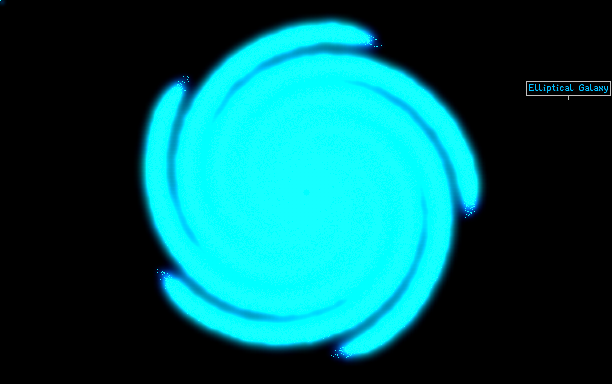Galaxy_Simulation by Skitz

Particles' positions and colors were calculated with a Lua script I put together. View with decorations enabled (preferably also with viewing mode 8) and unpause to watch the gravity diffuse the galaxy into a cloud of particles orbiting a central mass.
spiral
dontpress7
spore
galaxy
bigbang
universe
gravity
nothingdisplay
changegpmptemp
Comments
-
Skitz 28th Jun 2016
 Never mind that. I just figured it out.
Never mind that. I just figured it out. -
Skitz 28th Jun 2016
 Might anyone know of a way to interpolate between hexidecimal color values and convert those values into their RGB number components? I would like to make the galaxy's colors smoothly change out radially from the core with realistic blackbody colors based on temperatures.
Might anyone know of a way to interpolate between hexidecimal color values and convert those values into their RGB number components? I would like to make the galaxy's colors smoothly change out radially from the core with realistic blackbody colors based on temperatures. -
Anastasia_616 28th Jun 2016
 Everyone Run, The dark matter has disappeared From our Universe +1
Everyone Run, The dark matter has disappeared From our Universe +1 -
Skitz 28th Jun 2016
 In my Lua script, I gave every particle an initial velocity after having set their positions. The formula I used to determine orbital speeds is not realistic. I believe I need a value for the imaginary mass around which the particles may orbit. But am not sure about TPT's units. If I were to implement a brute-force gravity algorithm, I have no doubt that the program would become exceptionally slow.
In my Lua script, I gave every particle an initial velocity after having set their positions. The formula I used to determine orbital speeds is not realistic. I believe I need a value for the imaginary mass around which the particles may orbit. But am not sure about TPT's units. If I were to implement a brute-force gravity algorithm, I have no doubt that the program would become exceptionally slow. -
Schmolendevice 28th Jun 2016
 Heating up the GPMP to around 3.30 degrees allows the "stars" to linger a bit more. I've never opened up the code for TPT's newtonian gravity (mind any TPT source code), but I think a program can be written to set the orbital velocities of all particles in the "galaxy" as to achieve approximately centered circular orbits accordingly with Newton's Universal Law of Gravitation.
Heating up the GPMP to around 3.30 degrees allows the "stars" to linger a bit more. I've never opened up the code for TPT's newtonian gravity (mind any TPT source code), but I think a program can be written to set the orbital velocities of all particles in the "galaxy" as to achieve approximately centered circular orbits accordingly with Newton's Universal Law of Gravitation. -
Skitz 28th Jun 2016
 Perhaps that may be plausible here.
Perhaps that may be plausible here. -
Schmolendevice 28th Jun 2016
 Was this the intent (or understood consequence) or am I the only one witnessing a billion year old galactic civilization rendering all of its stars into rogue solar systems via widespread shkadov thrusters?
Was this the intent (or understood consequence) or am I the only one witnessing a billion year old galactic civilization rendering all of its stars into rogue solar systems via widespread shkadov thrusters? -
Skitz 28th Jun 2016
 Also try viewing this in persistent display.
Also try viewing this in persistent display. -
Skitz 28th Jun 2016
 Yes, it does. There are simple calculations using polar coordinates and a radius factor.
Yes, it does. There are simple calculations using polar coordinates and a radius factor. -
msasterisk 28th Jun 2016
 I assume the script also calculates the velocities?
I assume the script also calculates the velocities?